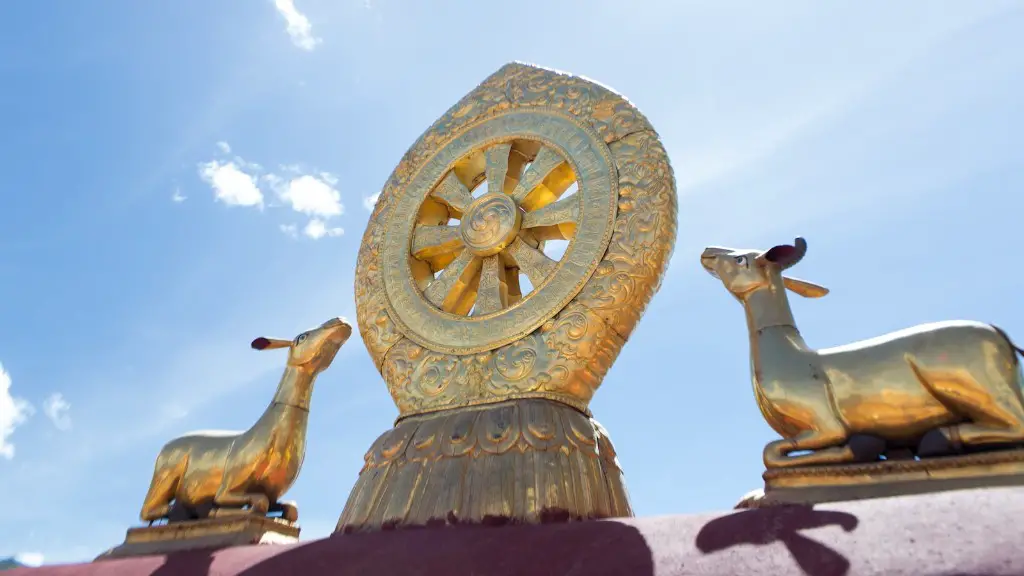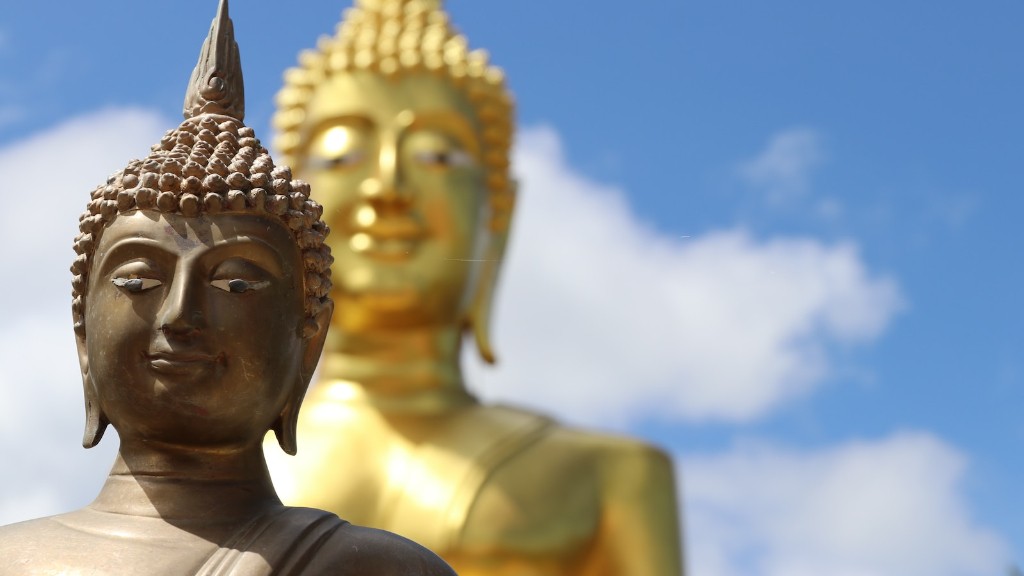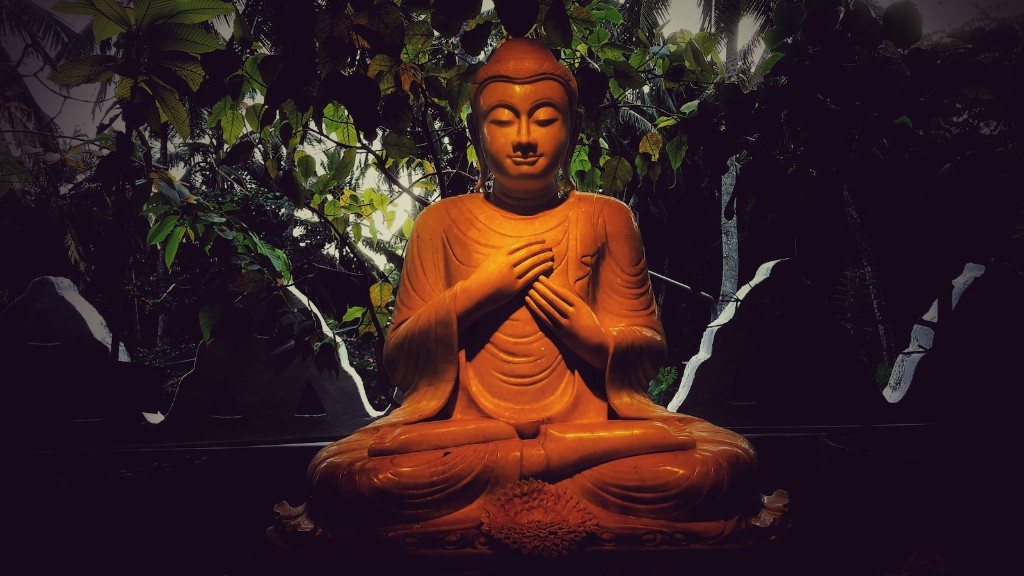The word dukkha is a Pali word that is used in Buddhism. It is often translated as “suffering,” but dukkha has a deeper meaning than just physical or mental pain. Dukkha includes the suffering that comes from being separated from what we love, from not getting what we want, and from being impermanent beings in an impermanent world. Dukkha is part of the human condition and is something that we all experience.
In Buddhism, dukkha is the concept of suffering. It is seen as the unsatisfactory and painful nature of existence. Dukkha is often translated as “suffering,” “anxiety,” “stress,” or “dissatisfaction.”
What is dukkha concept in Buddhism?
Dukkha is a central concept in Buddhist thought and is often translated as “suffering”. It refers to the unsatisfactory and painful nature of life. The cause of dukkha is attachment and craving, and it can be suppressed through the practice of mindfulness and meditation.
Dukkha, or suffering, is a universal human experience. It can be caused by physical pain, emotional distress, or simply the stress of everyday life. If we encounter a stimulus that is unpleasant, our mental reaction can range from a simple craving for it to stop (dukkha dukkha) to the mental formations of sankhara dukkha, such as “If he doesn’t stop honking that horn right now, I’m going to start screaming.” While we may not be able to avoid all suffering, we can learn to deal with it in a more skillful way. Through the practice of mindfulness, we can develop a greater capacity for awareness and compassion, which can help us to better cope with the inevitable difficulties of life.
Why is dukkha important in Buddhism
Dukkha is a very important idea in Buddhism as it is vital that Buddhists understand and accept that suffering exists. Buddhists must also strive to end suffering by understanding why people suffer. Suffering comes from craving things and also from events in a person’s life, such as birth, old age and death.
The first noble truth is that all life is suffering. This suffering can take many forms, including the suffering of physical and emotional discomfort and pain, the suffering of change, and the suffering of existence itself. While this may seem like a negative view of life, it is actually a realistic view that can help us to better deal with the suffering we experience. By understanding that suffering is a part of life, we can more easily accept it and find ways to cope with it.
How do you stop dukkha?
1. Identify and acknowledge the suffering: The first step to overcoming suffering is to identify and acknowledge the pain that you are experiencing. This can be a difficult process, but it is important to understand that the pain is real and that you are not alone in your experience.
2. Meditation — the most powerful tool: Meditation is a powerful tool that can help you to develop insight into the nature of suffering. By focusing your attention on the breath, you can begin to see the impermanent and transitory nature of all things.
3. Express compassion: Once you have developed some insight into the nature of suffering, it is important to express compassion for all beings who suffer. This includes yourself. By extending compassion to others, you can begin to lessen the hold that suffering has on your own life.
4. Understand that nothing is born or lost: A key insight into suffering is that nothing is ever really born or lost. Everything is impermanent and in a state of flux. This includes the suffering itself. By understanding this, you can start to see that the suffering is not really yours to hold onto.
5. Acknowledge that nothing is permanent: The final step is to acknowledge that nothing is permanent. This includes the
Dukkha, or suffering, is caused by our craving for things that are impermanent. The way to escape dukkha is to let go of craving. The Noble Eightfold Path provides a means to let go of craving and achieve nibbana, or liberation from suffering.
What is the truth of dukkha?
According to the noble truth of suffering, birth, aging, sickness, and death are all forms of suffering. Sorrow and lamentation, pain, grief, and despair are also forms of suffering. Association with the unpleasant is suffering, and disassociation from the pleasant is also suffering. Not to get what one wants is another form of suffering.
Dukkha, or suffering, is a fundamental part of the human experience. While some suffering is caused by objective factors such as death or physical pain, much of it is actually self-inflicted. This is because we have various cravings and attachments that lead to dissatisfaction and anguish.
When we crave things that we cannot have, or that are not good for us, this leads to suffering. For example, if we are attached to a particular person or possession, we may suffer if we lose them. Or if we constantly crave approval and validation, we may be disappointed and suffer when we don’t receive it.
Letting go of our cravings and attachments is not easy, but it is necessary if we want to find true happiness. By learning to live in the present moment and be content with what we have, we can start to reduce our suffering.
Is dukkha the first noble truth
Suffering is characteristic of existence in the realm of rebirth, called samsara. rebirth, or samsara, is the cycle of birth, death, and rebirth. Suffering, or dukkha, is the inherent unsatisfactoriness of life. The cause of suffering is attachment to things that are impermanent, such as our bodies, our possessions, and our relationships. The solution to suffering is to develop detachment from these things.
Desire and ignorance are the main causes of suffering in Buddhism. By desire, Buddhists refer to craving pleasure, material goods, and immortality, all of which are wants that can never be satisfied. As a result, desiring them can only bring suffering. Ignorance is not understanding the true nature of things, which leads to attachment and suffering. The solution is to understand the true nature of things, which is that they are impermanent and empty of self. This understanding will lead to detachment and the end of suffering.
How many levels of dukkha are there?
Dukkha is a difficult concept to explain, but it generally refers to the suffering that is experienced in life. This can include the physical and mental suffering associated with birth, growing old, illness and dying, as well as the anxiety or stress of trying to hold onto things that are constantly changing.
There is no denying that birth, aging, illness, and death are all part of the human experience and can often be sources of suffering. However, it is important to remember that even in the midst of duḥkha, there is still the potential for joy, love, and happiness. It is only through our own perception and attitude that duḥkha can be transformed into something more positive.
What are the 8 types of dukkha
Buddha identified eight causes of suffering, which are birth, death, decay, disease, association with the unpleasant, separation from the beloved, not obtaining what one desires, and the Five Aggregates (matter, sensations, perceptions, mental formations, and consciousness). These causes can lead to different types of suffering, such as physical pain, emotional distress, and mental anguish. By understanding the causes of suffering, we can learn how to avoid or reduce it in our lives.
The three poisons are the root cause of suffering. They are the ego, attachment and aversion. The ego is the sense of self-importance, attachment is the attachment to things and aversion is the aversion to things. These poison the mind and create suffering.
What does Buddha say about the end of suffering?
There is no question that if a Buddhist wants to end suffering, they shouldaea search for ways to avoid ignorance, hatred and cravings. However, it is important to remember that this is not a easy task. It will require great effort and perseverance to reach enlightenment.
It is important to remember that even though sukha (happiness) is the opposite of dukkha (suffering), it is not permanent. Just as dukkha can change to sukha, sukha can also change to dukkha. This is because all things in life are impermanent. Therefore, we should not get too attached to the things that make us happy, as they will eventually change.
What are the 5 sufferings in Buddhism
The kleshas are considered the cause of suffering in yogic and Buddhist philosophy and are to be actively overcome. The five Kleshas are Avidya (ignorance), Asmita (egoism or I-am-ness), Raga (attachment), Dvesha (repulsion and aversion), and Abhinivesha (fear of death and the will to live).
Buddhism teaches that forgiveness is a powerful act that can lead to inner peace and happiness. forgiveness is an essential part of the Buddhist path to enlightenment.
Forgiving ourselves can often be the most difficult step in the forgiveness process. We may feel that we don’t deserve forgiveness, or that we are not worthy of it. However, it is important to remember that forgiveness is a gift we give to ourselves. By forgiving ourselves, we are freeing ourselves from the past and opening ourselves up to new possibilities.
It is also important to forgive those who have harmed us. Forgiveness does not mean condoning or forgetting what happened. Instead, it is about letting go of the anger and resentment we may feel. Forgiving those who have harmed us can help us to move on with our lives and find peace.
Finally, we must also forgive those whom we have harmed. This can be a difficult thing to do, but it is necessary in order to move forward. We may feel guilty or ashamed of the things we have done, but we need to forgive ourselves and others in order to find peace.
Final Words
Dukkha is a Pali word that is typically translated as “suffering.” It is a fundamental concept in Buddhism, denoting the inherent unsatisfactoriness of temporal life.
Dukkha is a difficult concept to translate because it has a range of meanings in Buddhism. Generally, it refers to the unsatisfactory, painful and suffering nature of existence. This includes the inevitability of old age, sickness and death, as well as the fact that everything is impermanent and constantly changing. The Buddha taught that it is dukkha that drives us to seek happiness in things that are ultimately unreliable and unsatisfying. However, by understanding dukkha, we can develop the wisdom and compassion that are necessary to free ourselves from its grip.





